|
|
|
Sort Order |
|
|
|
Items / Page
|
|
|
|
|
|
|
| Srl | Item |
| 1 |
ID:
072219
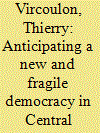

|
|
|
| 2 |
ID:
133855
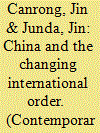

|
|
|
|
|
| Publication |
2014.
|
| Summary/Abstract |
From the beginning of 2014, the international order has undergone some quite dramatic changes in several parts of the world. The Ukrainian political crisis has gradually evolved into a U.S-Russia confrontation two decades after the end of cold war. In the Middle East, the extremist group, the Islamic State of Iraq and Al Sham (ISIS) invaded Iraq gaining much territory in the north of the country. Iraq has become a new unstable element in the Middle East. In Africa, the aftershock of the Arab Spring can be seen most prominently in Egypt and Libya. South Sudan and Central Africa are plagued by civil war. In the Asia-Pacific region Sino-Vietnam and Sino-Japanese Conflict have escalated and Japan has lifted a ban on collective self defence which threaten China's neighborhood security and regional stability.
|
|
|
|
|
|
|
|
|
|
|
|
|
|
|
|
| 3 |
ID:
138687
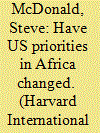

|
|
|
|
|
| Summary/Abstract |
At the end of the first ever US-Africa Leaders Summit on August 7, 2014, President Obama declared that it had been an “extraordinary event,” citing the accomplishments of the summit in terms of trade, investment, and security cooperation. Included in the latter category was a commitment to peacekeeping and the need to address corruption and bad governance in the continent.
|
|
|
|
|
|
|
|
|
|
|
|
|
|
|
|
| 4 |
ID:
137296


|
|
|
|
|
| Summary/Abstract |
UNTIL RECENTLY, the African countries north of the equator and south of the Sahara and their problems remained, on the whole, at the periphery of not only Russian but also the world's information and political field.
|
|
|
|
|
|
|
|
|
|
|
|
|
|
|
|
| 5 |
ID:
025218


|
|
|
|
|
| Publication |
New York, John Wiley & Sons,Inc, 1969.
|
| Description |
xi, 239p.hbk
|
| Standard Number |
471165794
|
|
|
|
|
|
|
|
|
|
|
|
Copies: C:1/I:0,R:0,Q:0
Circulation
| Accession# | Call# | Current Location | Status | Policy | Location |
| 009640 | 960.3/COL 009640 | Main | On Shelf | General | |
|
|
|
|
| 6 |
ID:
139693


|
|
|
| 7 |
ID:
124262
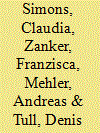

|
|
|
|
|
| Publication |
2013.
|
| Summary/Abstract |
Research on power-sharing in Africa remains silent on the effects of national peace agreements on the sub-national level. Conversely, most armed conflicts originate and are fought in (or over) specific areas. A plausible hypothesis would be that for power-sharing to have the desired pacifying effect throughout the national territory, it needs to be extended to the local level. Based on fieldwork in six former hotspots in Liberia, Burundi and the Democratic Republic of Congo (DRC) we find that there is hardly any local content, including local power-sharing, in national agreements. However, contrary to our hypothesis, neither local content (inclusion of actors or interest) nor local-power-sharing (either introducing a local power balance or monopoly) are indispensable to effectively bring about local peace, at least in the short-term. On the contrary, it might even endanger the peace process. The importance of the sub-national level is overestimated in some cases and romanticised in others. However, the history of spatial-political links, centralised policies, and the establishment of local balances or monopolies of power ultimately play an important role.
|
|
|
|
|
|
|
|
|
|
|
|
|
|
|
|
| 8 |
ID:
130477


|
|
|
|
|
| Publication |
2014.
|
| Summary/Abstract |
Twenty years ago, in 100 days of slaughter between April and July 1994, an estimated one million Rwandan men, women, and children were killed by their fellow citizens. It was one of the worst genocides in history, and its effects still ripple through Rwanda, central and eastern Africa, and the world at large. It would be obscene to say that such a catastrophe has had even the thinnest silver lining. But it did create a natural -- or unnatural -- experiment, as the country's social, economic, and political institutions were wiped out by the genocide. And in important respects, the reconstructed Rwanda that emerged over the next two decades is a dramatically different country. One major improvement has come in the leadership of Rwandan women, who have made history with their newly vital role in politics and civil society. No longer confined to positions of influence in the home, they have become a force from the smallest village council to the highest echelons of national government. Understanding how and why such a transformation occurred offers not just an opportunity to celebrate their accomplishments. It also provides lessons for other countries struggling to overcome histories of patriarchy and oppression.
|
|
|
|
|
|
|
|
|
|
|
|
|
|
|
|
| 9 |
ID:
165234
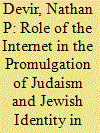

|
|
|
|
|
| Summary/Abstract |
This article presents selections from ongoing qualitative research dealing with the influence of the Internet on the diffusion and promulgation of different iterations of Judaism (not all of them normative) among individuals and communities, mostly from the Beti-Fang demographic, in Cameroon and Gabon. It assesses the influence of specific Internet-derived content on the personal and communal lives of the participants by way of integrative and qualitative discourse analysis methods. Throughout this study the aim is to enumerate the ways in which globalized media technology has been instrumental in propagating a specifically Jewish mode of ethno-religious identity.
|
|
|
|
|
|
|
|
|
|
|
|
|
|
|
|
| 10 |
ID:
096858


|
|
|
|
|
| Publication |
2010.
|
| Summary/Abstract |
Why are some peace processes accompanied by bloody political violence while others are not? Recent scholarship suggests that when factions fear that they will not benefit or will be excluded from a negotiated settlement these groups may protect their interests by sabotaging the peace process through violent tactics. We compare three peace processes in Africa - the negotiations to end armed struggles in Mali, the Western Sahara and Sudan - to investigate why spoilers arise in some contexts and not others. We argue that peace process exclusivity, that is negotiations between only some of the potential parties to a conflict, is more likely to breed violence than inclusive peace negotiations where all relevant groups have a seat at the bargaining table. A key to our argument is that the number and form of combatant groups is endogenous to peace process negotiations; as a result, exclusivity encompasses not just leaving out warring parties but also the exclusion of groups that might object to the terms of the peace should they be left out of the bargaining process. This is particularly important since many peace agreements include provisions regarding the distribution of government services, jobs, and representation that may indirectly impact the availability of those goods for other stakeholders, particularly non-combatant parties. While inclusive agreements may be harder to reach, our findings suggest that international organisations that participate in peace negotiations need to carefully consider the real-world trade-off between the ability to reach an agreement and the sustainability of that agreement over time.
|
|
|
|
|
|
|
|
|
|
|
|
|
|
|
|
| 11 |
ID:
118808
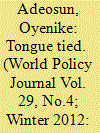

|
|
|
|
|
| Publication |
2012.
|
| Summary/Abstract |
Lagos-In her song "One Kilometer, One Language," Nigerian pop star Evi Edna Ogholi captures Africa's linguistic complexity. In pidgin English, she raps, "One kilometer means another language, half a kilometer means another language … na which one we go speak?" According to a 2010 UNESCO report, the number of indigenous languages in Africa ranges from 1,000 to 2,500. After the 19th century scramble for Africa, colonial governments also overlaid three other languages-the English that became dominant in West and East Africa, the French of West and Central Africa, and the Portuguese spoken mainly in southern Africa. Post-independence Africa is still tied to these languages. Though there have been calls for the promotion of indigenous languages, the reality on the ground may force African countries to rethink their language policy, and by implication, their entire economic, social, and cultural environment.
|
|
|
|
|
|
|
|
|
|
|
|
|
|
|
|
| 12 |
ID:
120224


|
|
|
|
|
| Publication |
2013.
|
| Summary/Abstract |
In June 2000, the Conference of Heads of State and Government of the Economic Community of Central African States (ECCAS) adopted the Protocol on the establishment of the Peace and Security Council for Central Africa (COPAX), with its two technical structures, namely the Central African Multinational Force (FOMAC) and the Central African Early Warning Mechanism (MARAC). MARAC is tasked with collecting and analysing data for the early detection and prevention of conflicts and crises. It currently consists of the Central Structure located at the ECCAS Executive Secretariat in Libreville (Gabon) and 31 Decentralised Correspondents spread throughout the ten member states of ECCAS. This article assesses the performance of MARAC in the light of its assigned objectives. Bearing in mind the peace and security challenges facing the central African sub-region, the central argument of this article is that while the establishment of MARAC is commendable, it flowed more from the logic and context of the establishment of similar mechanisms on the African continent during the same period than from any displayed capacity and/or readiness on the part of ECCAS to implement the recommendations due to emanate from such a structure.
|
|
|
|
|
|
|
|
|
|
|
|
|
|
|
|
| 13 |
ID:
011907


|
|
|
|
|
| Publication |
June1997.
|
| Description |
144-146
|
|
|
|
|
|
|
|
|
|
|
|
|
|
|
|
|
|
|
|
|